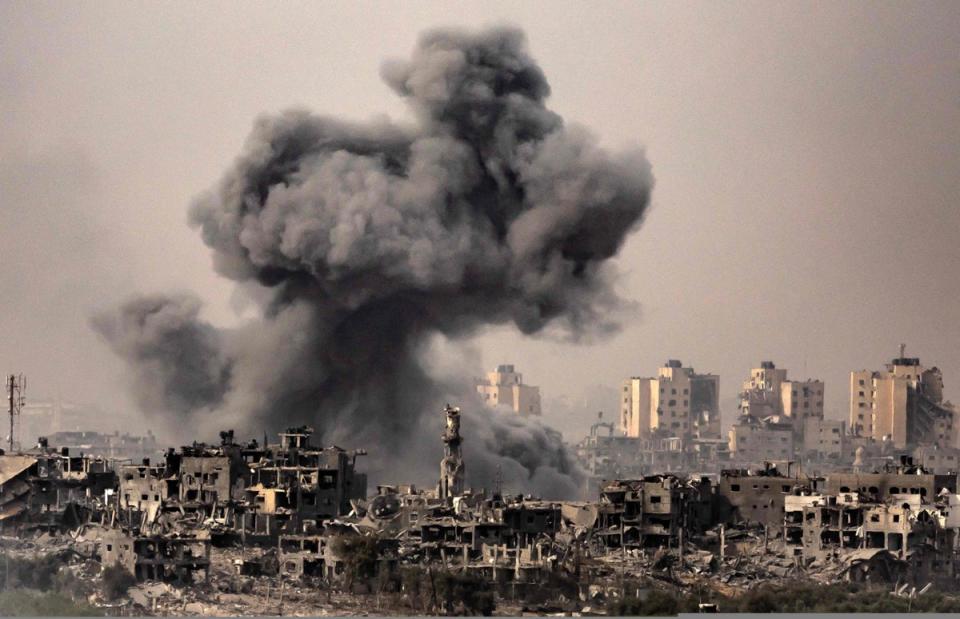Bibi on the brink: Can Netanyahu survive a growing chorus of disapproval?

- Oops!Something went wrong.Please try again later.
It started, as so many stories do, with a late-night, ill-advised tweet. In the early hours of Sunday morning, Israel’s prime minister, Benjamin Netanyahu, took a stunning swipe at his intelligence chiefs in a missive posted to Twitter/X. He wrote emphatically that they had never warned him that Hamas was planning a major attack on 7 October.
It echoed similar claims made to me by members of the Likud party, led by Netanyahu, who have spent years working alongside his team in the government and are stalwart supporters. Several hours before the tweet, one individual eagerly insisted that Netanyahu was only informed by the domestic intelligence agency Shin Bet at 6.30am local time while Hamas’s unprecedented attack was underway. “So what could he possibly do?” the individual asked repeatedly.
And so, just before dawn on Sunday, Netanyahu posted that “at no stage” was he warned of Hamas’s intentions to start a war – everyone from military intelligence to the Shin Bet told him everything was “normal”.
But the very public jab went down very badly, as Netanyahu had already attracted fierce criticism for failing to take any responsibility for the unprecedented intelligence and operational failure over Hamas militants’ bloody rampage through southern Israel, which killed more than 1,400 people. This despite the fact the chief of the Israeli military, domestic intelligence agencies and the defence and finance minister have all, effectively, in roundabout ways, apologised to the Israeli population.
In fact, 80 per cent of the country (including a high percentage of Likud voters) think Netanyahu should publicly apologise and accept responsibility, according to an opinion poll by the Maariv newspaper, published last week.
As Yossi Cohen, who headed the Mossad spy agency under previous Netanyahu governments, told Israel Radio: “You take responsibility from the beginning of your job, not from the middle.” And so on Sunday morning, amid a thunderstorm of criticism – including comments from members of his own war cabinet and former chief of staff – Netanyahu retracted his comments and issued a rare apology.

But the damage was done and it doesn’t mean that the message is going to change, according to Anshel Pfeffer, a prominent British-Israeli journalist and author of the biography Bibi: The Turbulent Life and Times of Benjamin Netanyahu. “From day one, Netanyahu has been briefing journalists and leaking through other means this message that he knew nothing,” Pfeffer told The Independent.
“The fact he put it out in a tweet which turned out not to be a good move doesn’t mean it changes. He is trying to use a very narrow window of time to minimise the event and make it about a tactical issue rather than a strategic and long-term error.”
But many believe it goes far beyond a decision whether or not to respond to warnings in the hours before the attack – particularly as 7 October was likely years in the planning. Netanyahu was “the father of the strategy of allowing Hamas to remain in Gaza”, despite warnings, Pfeffer says. He says that Netanyahu believed the threat was contained and “it would divide the Palestinians and weaken them”.
There are many in Israel who believe the problems also stem from Netanyahu’s support for dangerous far-right policies and extremist allies, who peddle among many things: overt steps to annex the occupied West Bank; support of a very aggressive settlement expansion programme; and the defanging of the judiciary.
And so the fallout from this unprecedented event is harming his popularity to the point that some think it could end his career – the seemingly invincible career of a politician who has weathered many storms, including a relentless cycle of failed elections, and an ongoing corruption trial. Netanyahu, of course, denies all charges.
In another poll published by Maariv, Netanyahu’s personal ratings have hit rock bottom. Two-thirds of the respondents said they would prefer literally anyone else to Netanyahu as prime minister, said Dahlia Scheindlin, a veteran Israeli pollster. His chief competitor Benny Gantz, who recently entered the country’s war cabinet, is now the country’s preferred choice “with a double-digit lead”.
She went on: “Netanyahu’s personal ratings had declined prior to 7 October ... due to efforts to undermine Israeli democracy. These indicators plunged to new lows following 7 October, as a near-consensus of Israelis believed the events represented a leadership debacle.”
Protests, though small, are gathering apace, particularly among the families of the more than 230 hostages held captive in Gaza. They are increasingly worried that Netanyahu is more concerned with his political future, and razing Gaza, than getting their loved ones home. His late-night tweeting has not helped.

